MATTERS OF OBSESSION
Living on instinct: ‘Nomadland’ is an elegy for our times
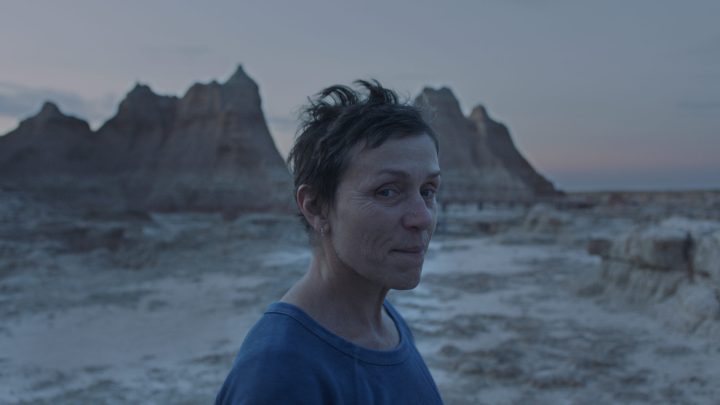
‘I’m not homeless. I’m just houseless. It’s not the same thing.’ The Best Picture Oscar favourite is about a 61-year-old widow who discovers a new way of life, and in so doing also encounters the freedom and brutal honesty of the open road.
Nomadism is not for everyone. Once upon a time, perhaps, before agriculture took hold and eventually settled us. Today, the nomadic life requires a certain tenaciousness, pluck, daring. Or perhaps a dearth of other options.
For the rest of us – the settled, permanently housed, stationary, often stagnant – there’s a kind of mixed attitude towards nomads. On the one hand, we’re quick to romanticise so-called “primitive” cultures that cling to an ancient way of life, one that we – from a safe sort of distance – respect and venerate. We imbue the people, some of the last of whom live right here in southern Africa, with a nobility that – in theory at least – supersedes our own sense of refinement, civility, social evolution.
On the other hand, there’s a persistent nastiness towards certain wandering people. The Roma, for example, certain tiers of immigrants, and the homeless. All are treated with some degree of disdain.
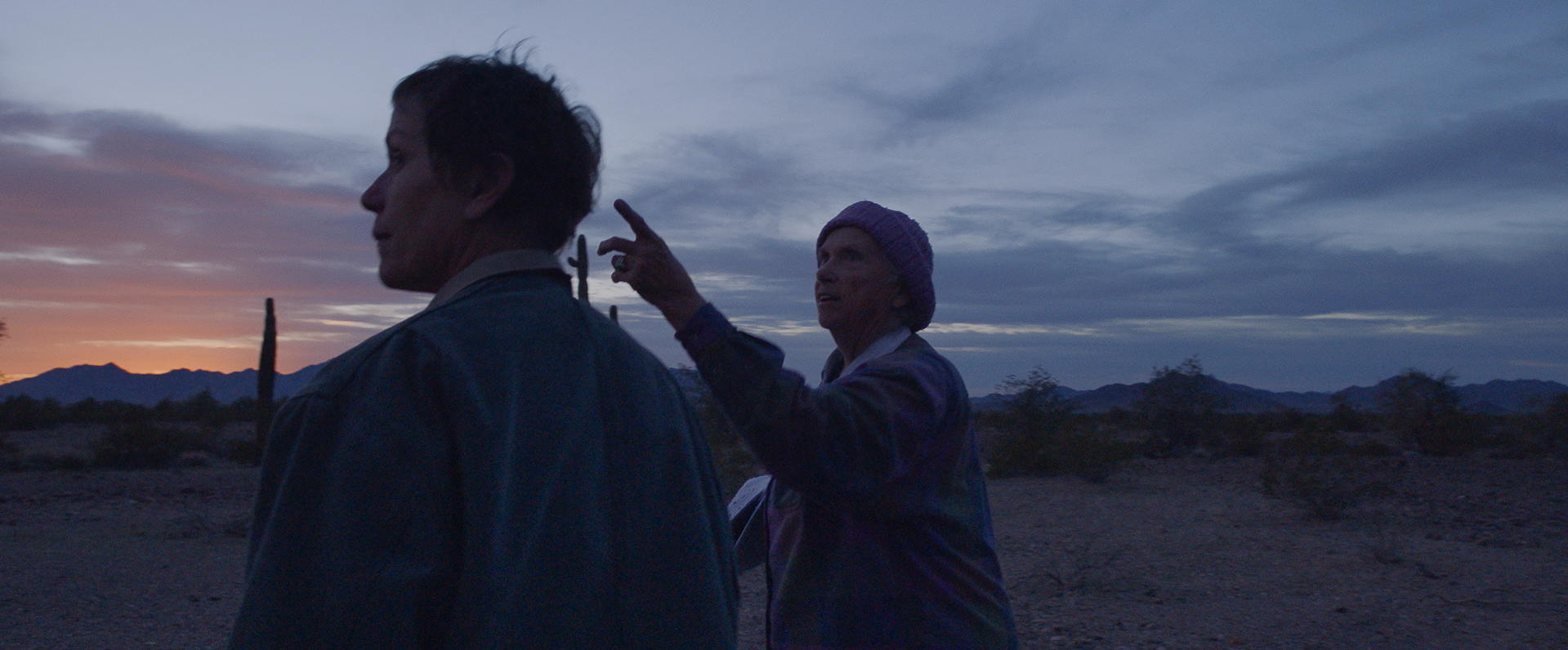
Frances McDormand and Swankie in the film NOMADLAND. Photo Courtesy of Searchlight Pictures. © 2020 20th Century Studios All Rights Reserved
Within our contemporary social framework, untethered wanderers tend to be frowned upon. Treated with suspicion, seen as outsiders, usually with fewer rights. They are deemed a burden.
Of course that attitude shifts with regards to another sort of romanticised wanderer – so-called digital nomads. These sorts of trendy wayfarers are marketed as vagabond explorers capable of inhabiting the world with little more than a laptop and a smartphone. They’re admired, worshipped on Instagram, venerated.
But they’re only one smidgen of the story of people who do not have a permanent address. The sexy part.
Zhao has created something of a paradox. It is what most would consider a small film – intimate, quiet, contained.
There’s another kind of contemporary drifter, though. A variety who – as a subculture – are the subjects of Nomadland, a work of sublime, poetic cinema by third-time director Chloé Zhao. These modern-day nomads – many of them itinerant workers, many of them having hit hard times and forced to abandon their houses or quit towns where work has dried up – were first the subject of an eponymous, scrupulously researched book by Jessica Bruder.
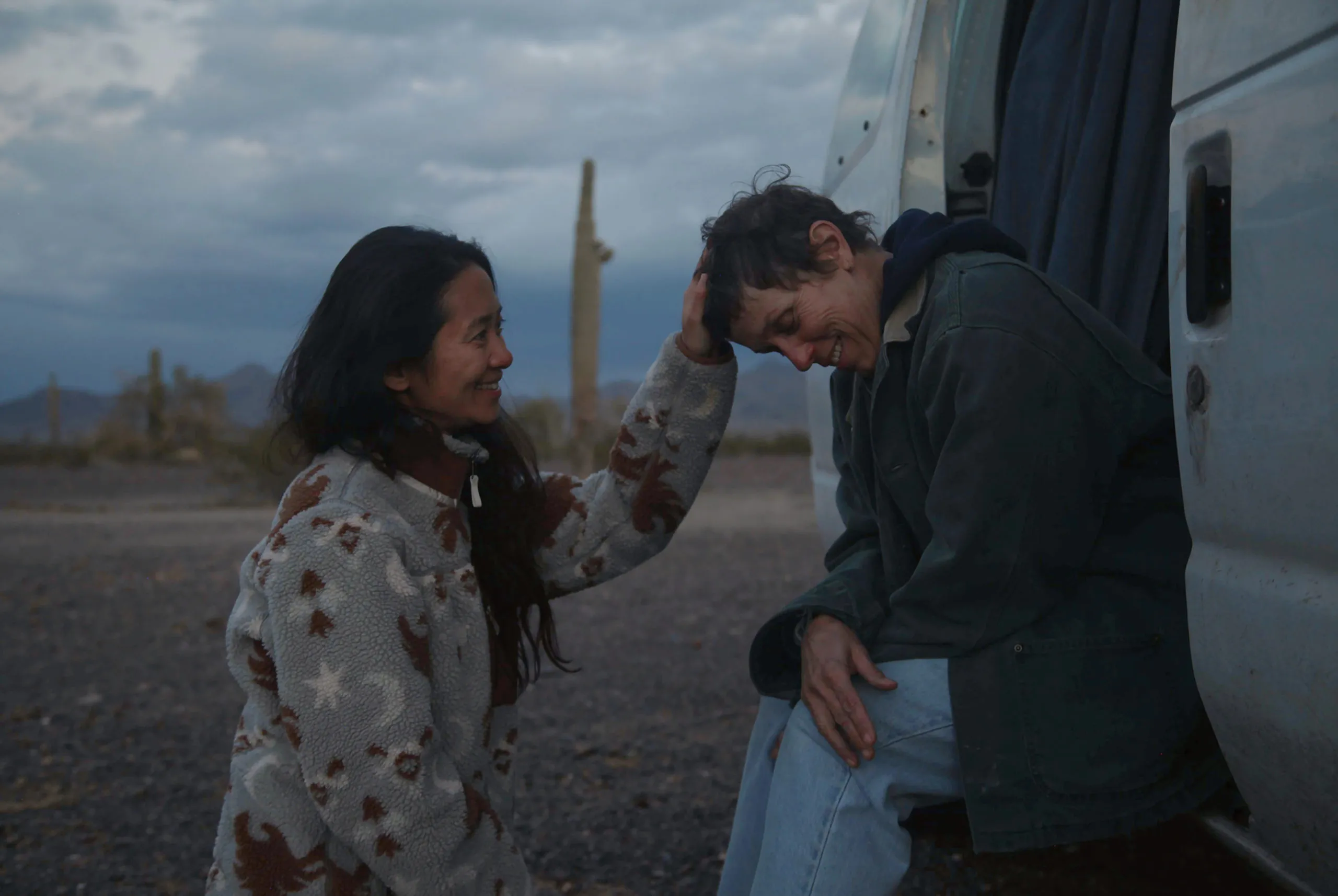
Director/Writer/Editor/Producer Chloé Zhao and Frances McDormand on the set of NOMADLAND. Photo by Joshua James Richards. © 2020 20th Century Studios All Rights Reserved

Frances McDormand and Director/Writer Chloé Zhao on the set of NOMADLAND. Photo by Joshua James Richards. © 2020 20th Century Studios All Rights Reserved
Zhao has exquisitely adapted Bruder’s work of non-fiction into a highly watchable kind of elegy centred on a fictional character named Fern, whom Frances McDormand inhabits as though she’s known her all her life. Many of the other characters are true nomads playing semi-fictionalised versions of themselves – to the extent that there’s often a documentary quality, a heightened texture of realism that factors into this film’s aura of authenticity.
It is almost certainly the favourite to win this year’s Best Picture Oscar, and Zhao will likely become the second woman in history to receive the Academy Award for directing.
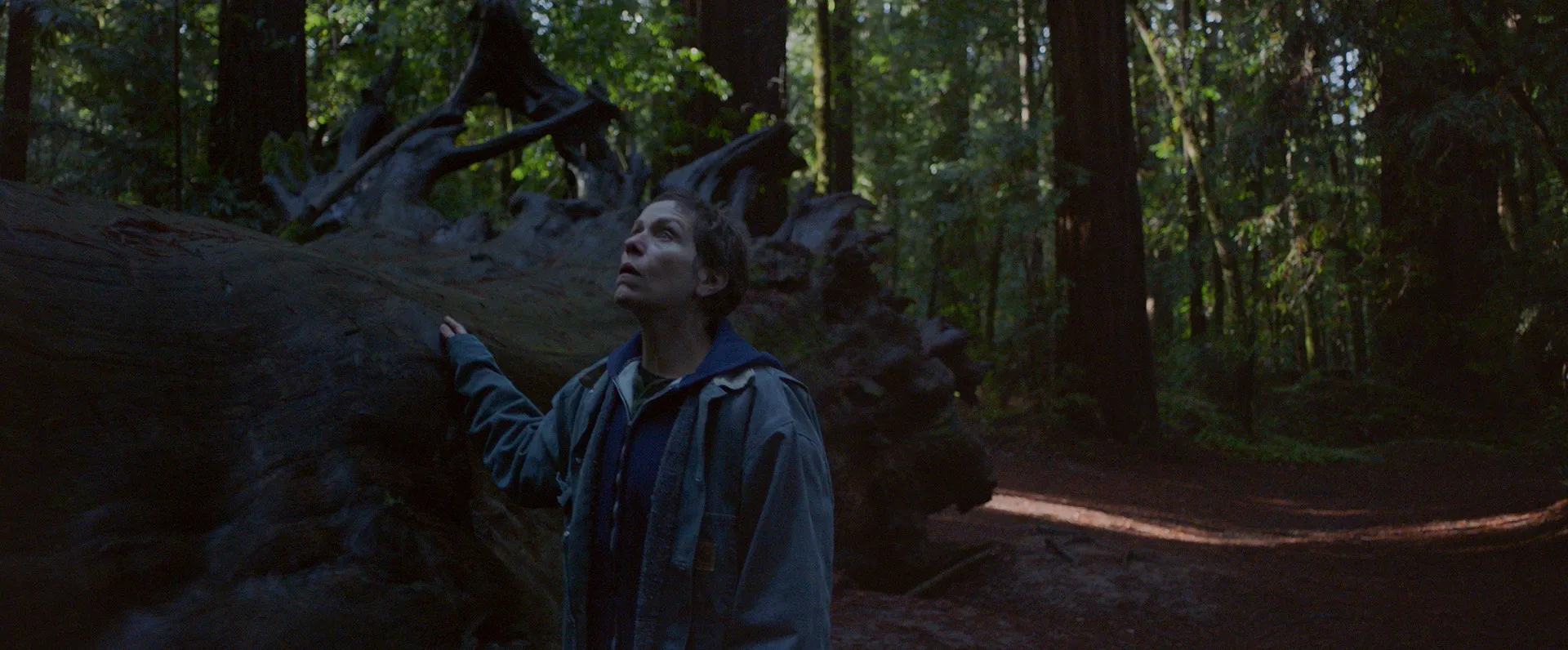
Frances McDormand in the film NOMADLAND. Photo Courtesy of Searchlight Pictures. © 2020 20th Century Studios All Rights Reserved
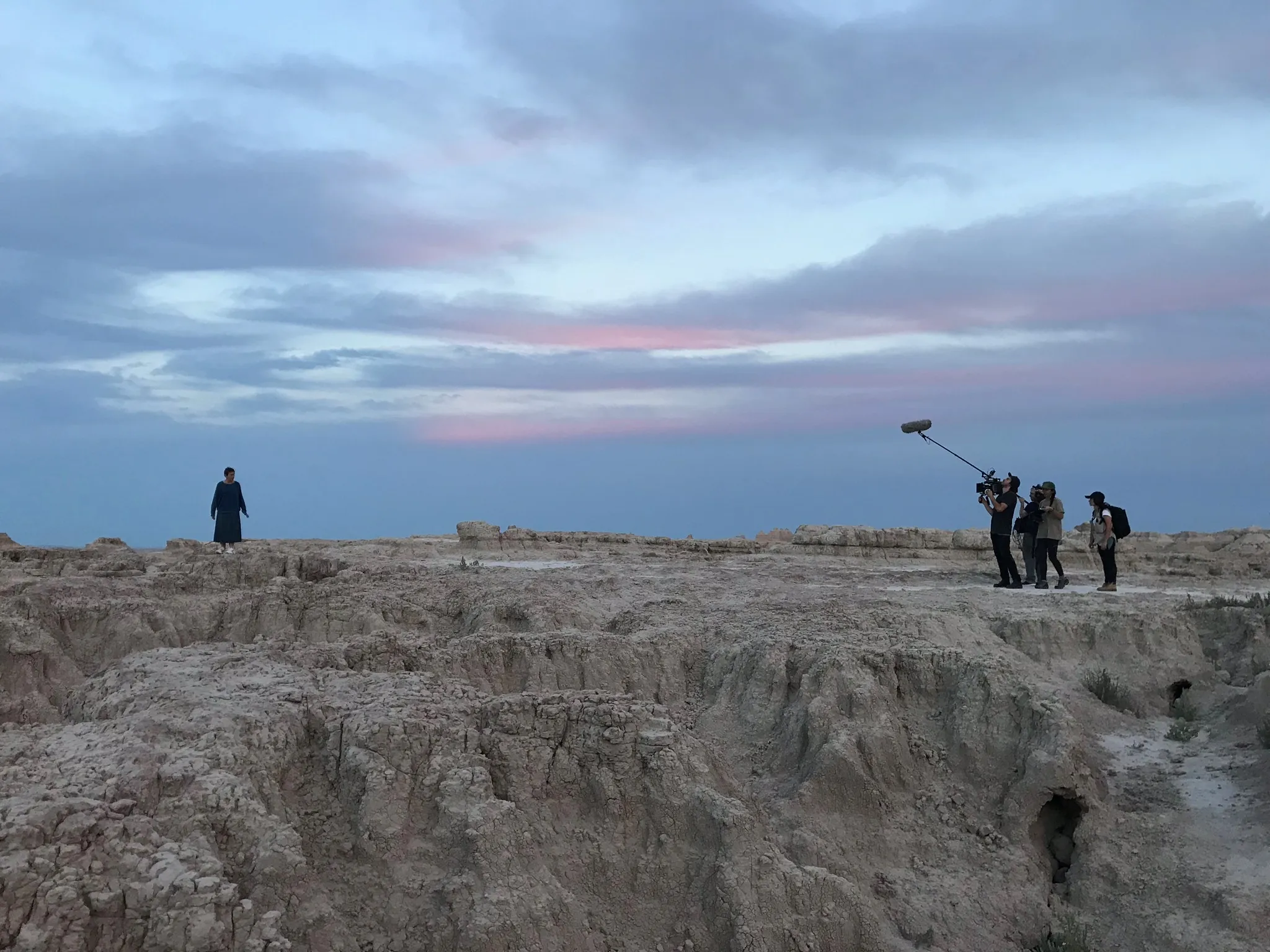
Frances McDormand and crew on the set of NOMADLAND. Photo Courtesy of Searchlight Pictures © 2020 20th Century Studios All Rights Reserved
Zhao has created something of a paradox. It is what most would consider a small film – intimate, quiet, contained. What used to be called arthouse. And yet there’s majesty. It feels enormous, expanded by the road-movie elements that take Fern – and us – into the vast heartland of America. Into its wide-open expanses of desert, its snow-covered plains, its ancient forests of monumental trees, and to the wave-battered coastline at the edge of an endless ocean.
There is a sense that we are witnessing Fern crack open some sort of frontier, exploring the world, navigating as a pioneer.
The nomad tribe to which Fern belongs is a group of people who have made alternative decisions, whether because of economic hardship, or some other reason.
And yet this is not a Western, not a cowboy flick. It is a film about people who choose – or are forced – to live in their caravans, their trailers, their vans and tents. People who have no fixed address and have compressed their entire existence into the confines of a vehicle.

Frances McDormand in the film NOMADLAND. Photo Courtesy of Searchlight Pictures. © 2020 20th Century Studios All Rights Reserved
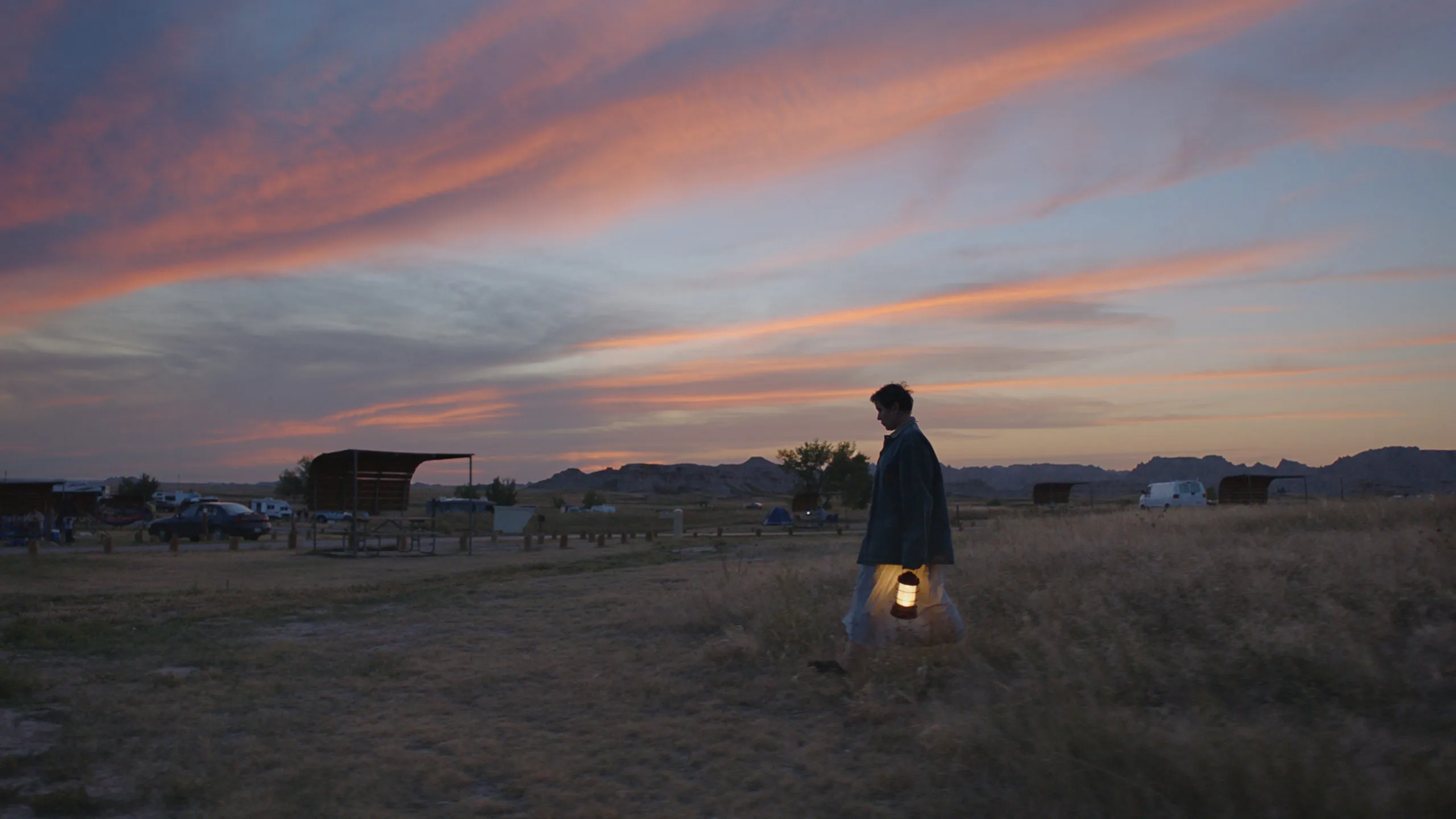
Frances McDormand in the film NOMADLAND. Photo Courtesy of Searchlight Pictures. © 2020 20th Century Studios All Rights Reserved
They regard themselves not as homeless, but houseless. As Fern points out when she’s treated to one instance of the customary pity that well-meaning non-nomads send her way, there is a difference. The nomad tribe to which Fern belongs is a group of people who have made alternative decisions, whether because of economic hardship, or some other reason.
In the case of Fern, a widow whose emotional landscape has been scorched by the loss of her husband, it’s because the Nevada town where she’d lived has ceased to exist following the closure of the mine and factory for which it had been established. With the last of her large possessions in a storage garage, she kits out her van so she can eat, sleep, cook, defecate and exist in it. She christens it Vanguard, and sets forth to see what she can see and to pick up what casual jobs she can find.
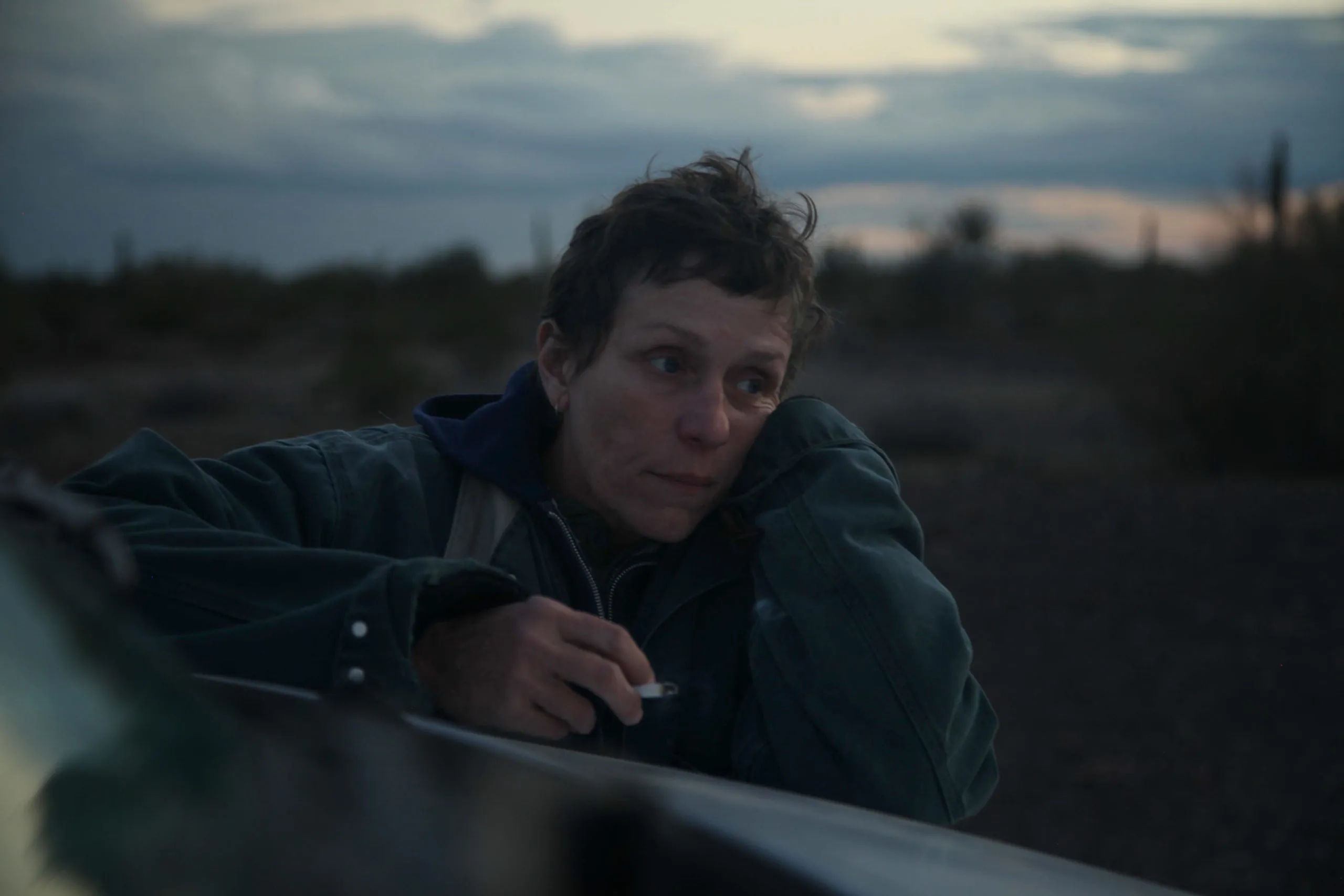
Frances McDormand in the film NOMADLAND. Photo by Joshua James Richards. © 2020 20th Century Studios All Rights Reserved
We get a glimpse into the kinds of labours such wanderers endure, from grunt work at Amazon warehouses to heavy lifting and carrying at vegetable factory farms. And there are periods of work at caravan parks, ironically cleaning toilets for folks whose idea of a holiday is getting their own brief taste of the nomadic lifestyle.
While this element of social critique is present and occasionally finds its way into monologues and even conversations around the proverbial dinner table, the film’s real strength is the manner in which it shines a light on the vagabond lifestyle. Its difficulties and hardships are vividly captured, but what we take away is the ingenuity, the unwillingness to surrender, the derring-do, and the camaraderie between fellow nomads.
There’s a section of the film during which Fern, initially sheepishly, attends the “Rubber Tramp Rendezvous”, an annual gathering of van dwellers started by Bob Wells, a bearded nomad lifestyle guru.
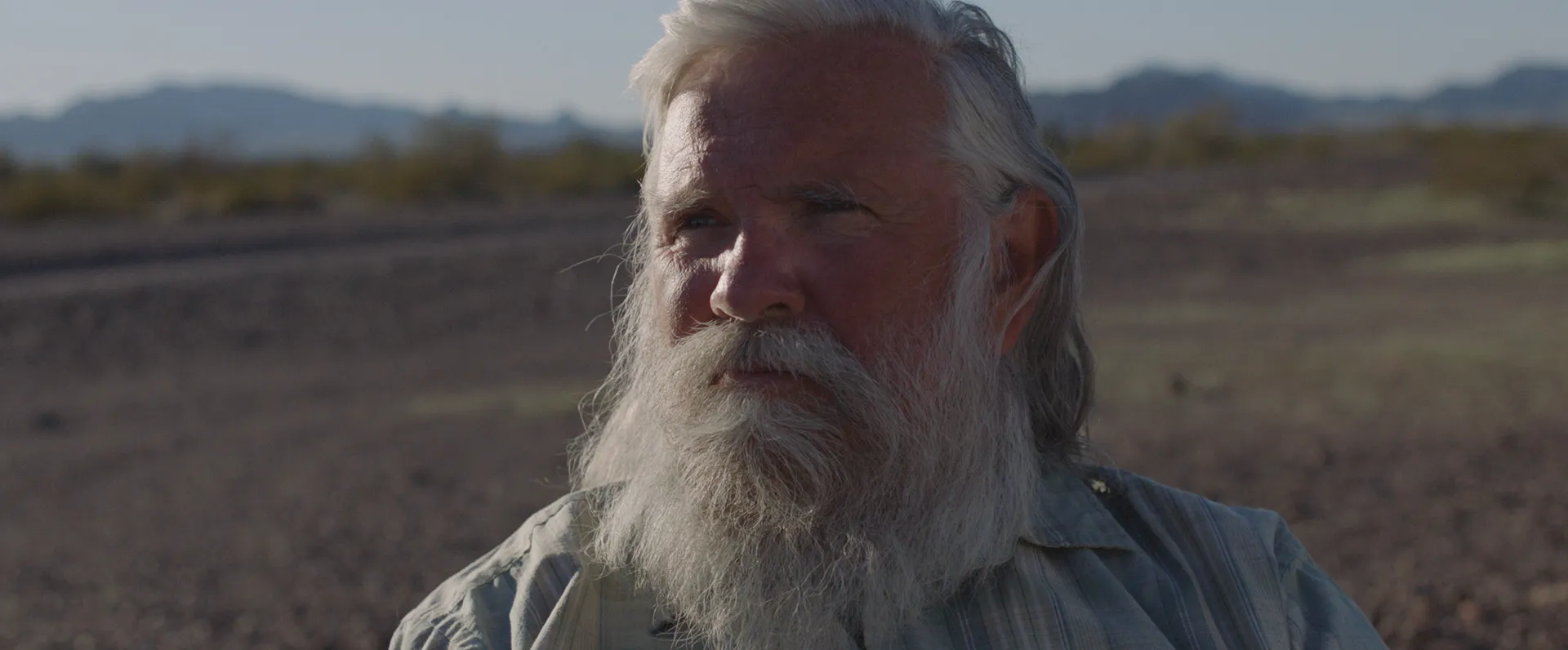
Bob Wells in the film NOMADLAND. Photo Courtesy of Searchlight Pictures. © 2020 20th Century Studios All Rights Reserved
There, in a setting that might at a glance be mistaken for a scaled-down AfrikaBurn without all the glamour, excess and bullshit, Fern meets an array of fellow nomads. In the guise of social encounters, we’re made privy to their disparate backgrounds and motivations.
We hear, from among them, candid monologues – actual stories from non-professional actors who are playing versions of themselves.
It’s telling that the people who have so little of their own seem to have so much to give.
There’s the war veteran with PTSD who has been unable to integrate into “normal” life, and says: “I’ve got a camper and I can live out here and be at peace.”
And there’s Wells himself, who explains how his son’s suicide broke him to such an extent that it is only by constantly travelling, living out his days on the road, that he is able to endure. Not only that, he says, but he finds solace in being able to help others – by being of service to his fellow nomads, he says, he honours his son’s memory. It’s a breathtaking speech, touchingly delivered without embroidered emotions, not in the least bit acted, more confession-style revelation than to-camera performance.
Open-hearted honesty isn’t always so heavy, though.
At the same conclave, a woman gives a workshop on how to select the right-size bucket for use as a toilet when you’re living in a van. “I love the lifestyle,” she says. “It is a lifestyle of freedom and beauty and connection to the earth. Yet there’s a trade-off. You gotta learn how to take care of your own shit.”

Director/Writer Chloé Zhao and Frances McDormand on the set of NOMADLAND. Photo Courtesy of Searchlight Pictures. © 2020 20th Century Studios All Rights Reserved

(From L-R): Director/Writer Chloé Zhao, Director of Photography Joshua James Richards and Frances McDormand on the set of NOMADLAND. Photo Courtesy of Searchlight Pictures. © 2020 20th Century Studios All Rights Reserved
Yes, these folks who live through periods of extended loneliness, who deal with despair, and are often facing the consequences of financial ruin, or worse, also have a sense of humour.
In fact, they are in many ways emotionally astute, sensitive, nurturing and naturally caring. It’s telling that the people who have so little of their own seem to have so much to give. They assist one another and they reach out to those in need.
What you notice, too, is that they have, to what one might consider an extreme extent, sloughed off material possessions. Beyond their essentials, and a few meaningful keepsakes (sometimes a rock holds meaning, sometimes it’s a piece of clothing that belonged to a loved one), they know what’s truly important.
Community, fellowship, memories. These are the things that matter.
As does being able to change a tyre. Or pay for an engine when the one in your van gives up the ghost.
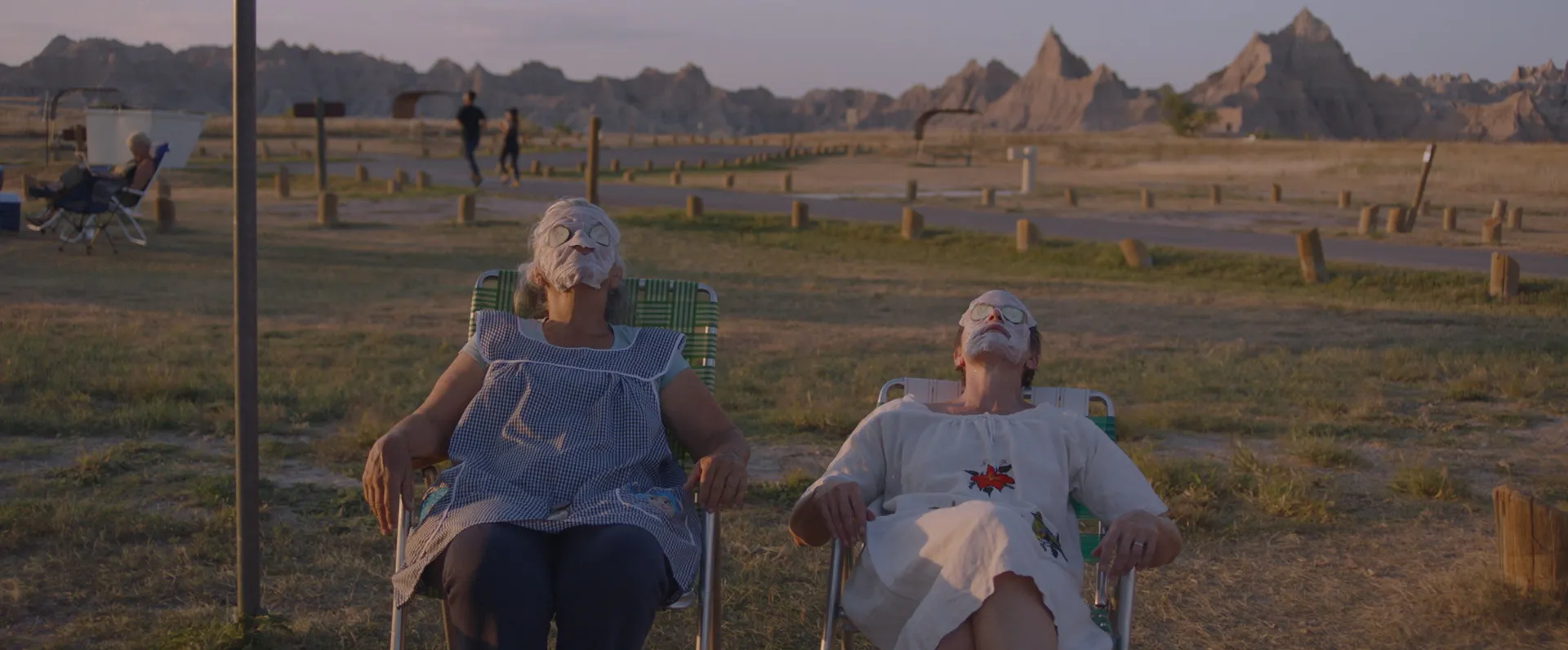
Linda May and Frances McDormand in the film NOMADLAND. Photo Courtesy of Searchlight Pictures. © 2020 20th Century Studios All Rights Reserved
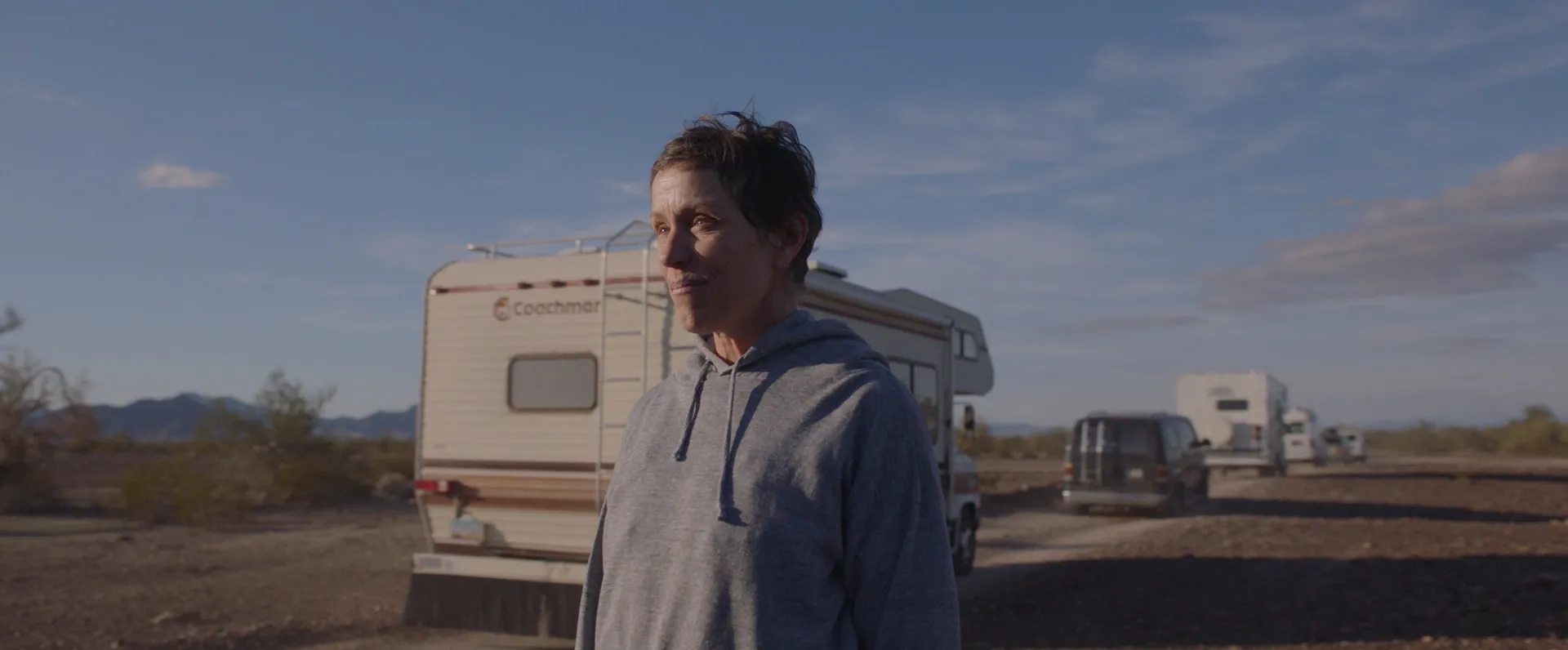
Frances McDormand in the film NOMADLAND. Photo Courtesy of Searchlight Pictures. © 2020 20th Century Studios All Rights Reserved
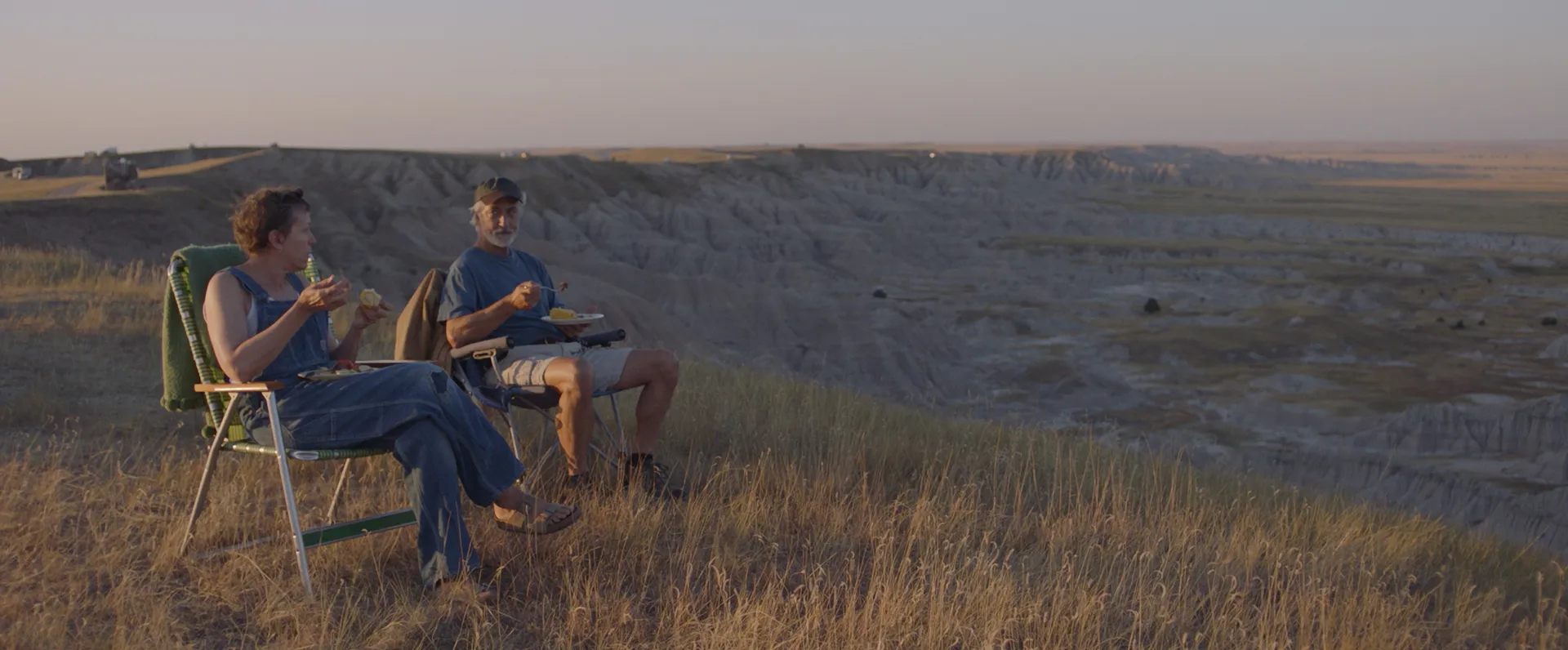
Frances McDormand and David Strathairn in the film NOMADLAND. Photo Courtesy of Searchlight Pictures. © 2020 20th Century Studios All Rights Reserved
The film does not paint a picture of an easy life. It doesn’t shy away from showing the extent of the struggle when something goes wrong, when you’re all alone and the brutal reality of what it takes to survive becomes apparent.
And yet what we discover about these nomads – what we learn from Fern’s stoic gaze, the emotional map of her face and her body, her gait, her posture, her exhalations – is that they are resilient. That, despite living at the fringes with next to nothing, they have agency.
It is not a pity-party film; it is about people who have made a choice; they have opted to live differently, and in so doing have cultivated a kind of freedom – the liberty to pack up and move on at any moment.
So while it may be instinctive for those of us with a permanent address to assume that this sort of nomadic existence is a kind of cruelty forced upon people like Fern, the film resounds with evidence to the contrary. Time and again, she rejects offers to throw down roots, whether to settle under her sister’s roof or quit the nomad life for a comfortable cottage on a farm.
Fern does not wander because she has no other options. She seems to do it because it makes her feel freer.
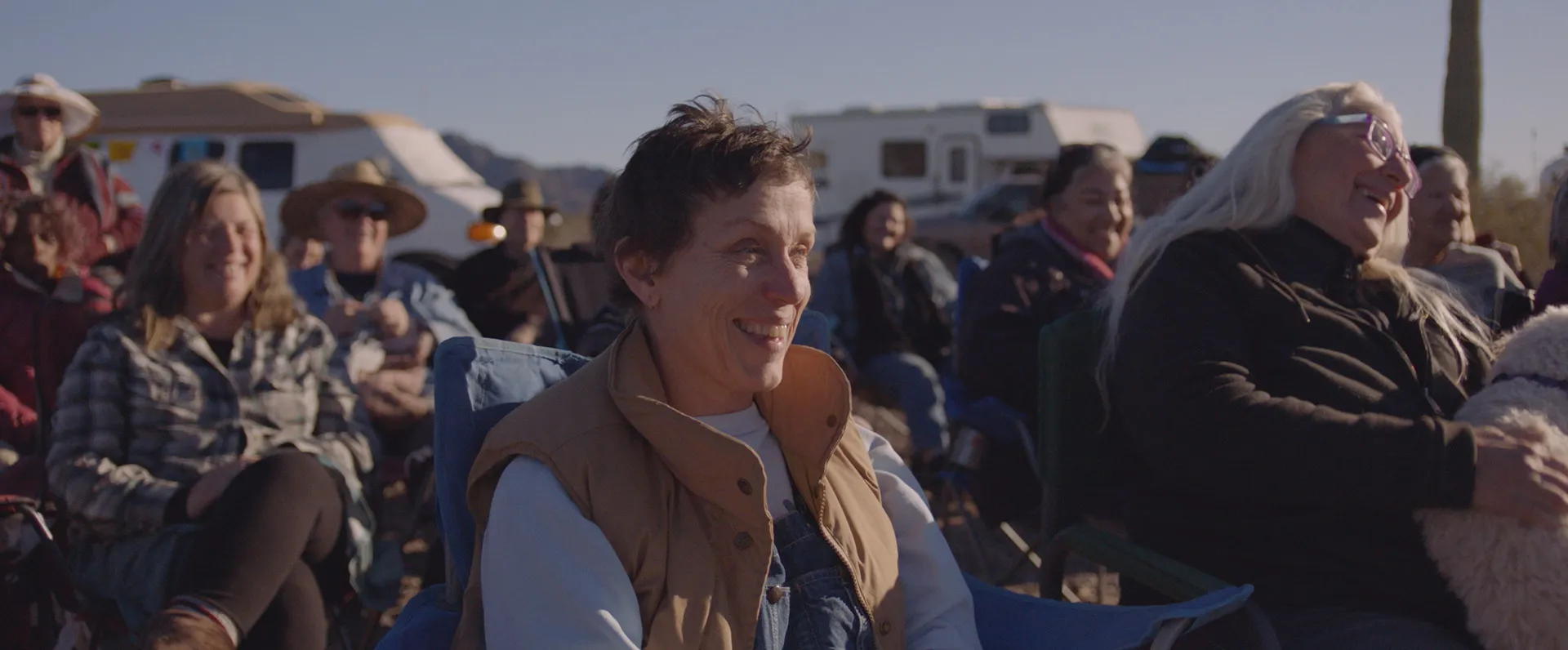
Frances McDormand in the film NOMADLAND. Photo Courtesy of Searchlight Pictures. © 2020 20th Century Studios All Rights Reserved
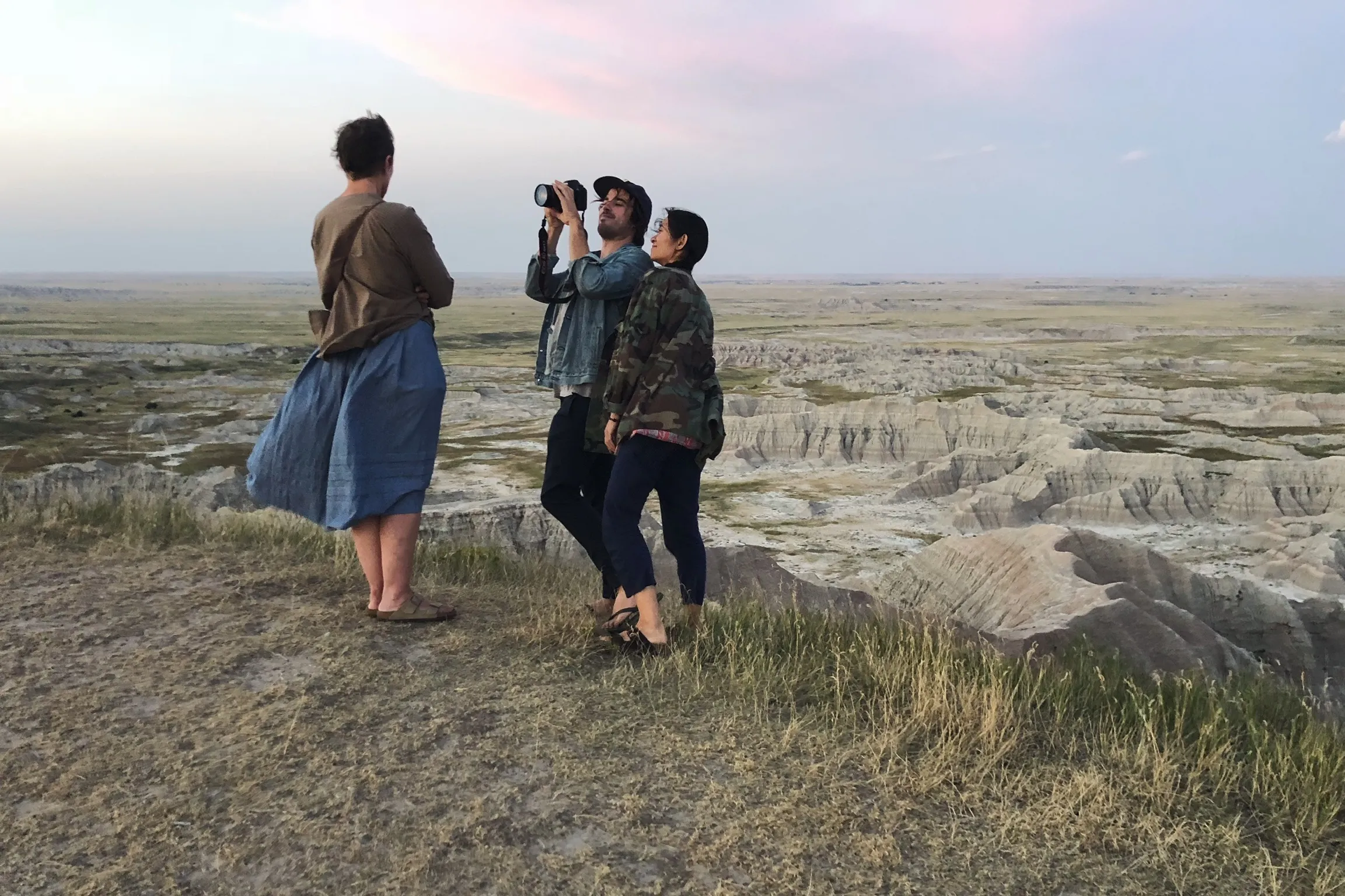
(From L-R): Frances McDormand, Cinematographer Joshua James Richards and Director/Writer/Editor/Producer Chloé Zhao on the set of NOMADLAND. Photo Courtesy of Searchlight Pictures © 2020 20th Century Studios All Rights Reserved
There is, mixed in with the hellish moments, a constant adventure, one that is simultaneously physical and existential. Whether it is the act of figuring out the next destination or figuring out what size bucket to pick for a toilet, life is possessed of a pioneering spirit; these are not social misfits and outcasts or runaways – they are modern-day explorers, forever chasing a new frontier.
It is not a film of intense action or big events, and that only adds to the pleasure – the small moments feel momentous. You are touched by tiny gestures and intimate conversations; small suggestions of what it is to be human. When Fern discovers a puncture and you witness the trouble she must go to get it repaired, you quickly recognise how valuable we humans are to one another.
Ultimately, for anyone watching this film after a year-or-so of life restricted by the pandemic, there is likely to be a great sense of it reminding you of the preciousness of human solidarity, of our interconnectedness. In its handling of various aspects of isolation and loneliness, social estrangement and disconnection, it somehow hits the zeitgeist on the head. DM/ML
Nomadland opens in South African cinemas on 16 April. It earned the Golden Lion, the top prize at 2020’s Venice Film Festival, and – along with an armful of other prizes already – has six Oscar nominations. Besides Zhao’s four (Best Picture, Director, Editor and Adapted Screenplay), there’s Frances McDormand for Best Actress and Joshua James Richards for his rapturous cinematography.















 Become an Insider
Become an Insider
Comments - Please login in order to comment.